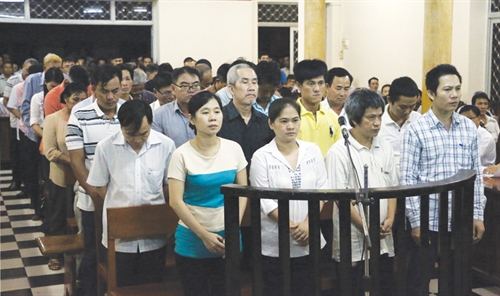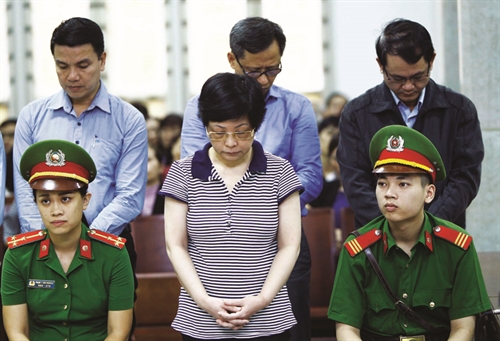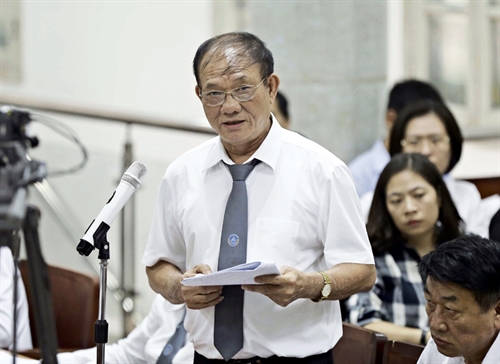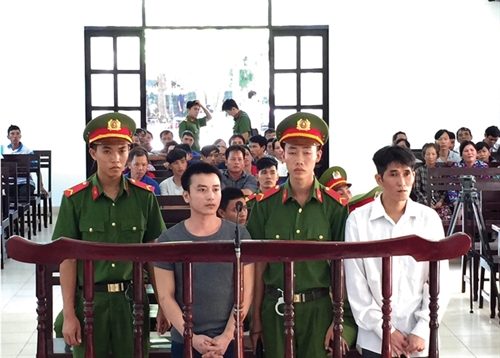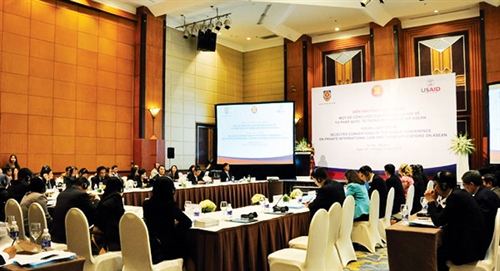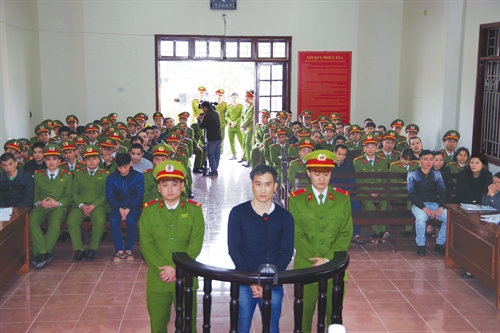The 2015 Civil Procedure Code of Vietnam has for the first time provided for the right to choice of court agreement in cross-border litigation. This article points out that such provision is inadequate and needs specific guidance to ensure uniform understanding and application.
Phan Hoai Nam
International Law Faculty
Ho Chi Minh City University of Law
Laws of most countries around the world recognize, directly or indirectly, the right to choice of court/jurisdiction agreement for deciding disputes in the realm of private international law.
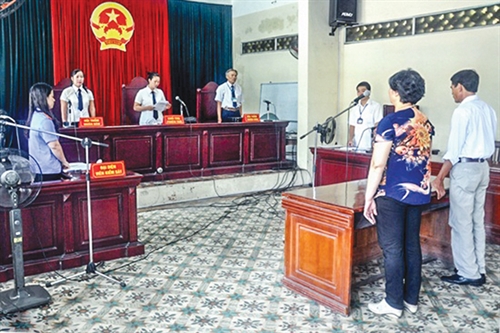 |
| Arrangements of a civil court hearing__Photo: Internet |
In Vietnam, the 2015 Civil Procedure Code (the Code) is the first that officially provides for this right. Under Article 470.1.c of the Code, the Vietnamese court has exclusive jurisdiction over “other civil cases which the parties are entitled to choose the Vietnamese court to settle in accordance with Vietnamese law or a treaty to which the Socialist Republic of Vietnam is a contracting party and they agree to choose the Vietnamese court to settle.” This means that an agreement on choice of a Vietnamese court to decide a dispute would give rise to the exclusive jurisdiction of such court. However, the content of this provision is insufficient to solve theoretical and practical problems concerning this issue.
Jurisdiction of the court based on choice of court agreements
Before the enactment of the Code, the choice of court agreement was mentioned in only two specialized laws, namely the 2005 Maritime Code and the 2005 Investment Law1. The 2004 Civil Procedure Code did not address this issue, even in its provisions on determination of the jurisdiction of Vietnamese courts over civil cases and matters involving foreign elements, thus leading to different ways of settling cases where involved parties had a choice of court agreement.
In some lawsuits, while the court recognized the agreement between the parties on choice of courts to decide their contractual disputes, the ground for it to have jurisdiction over such disputes was the plaintiff’s choice as per Article 36.1.b of the 2004 Civil Procedure Code2. In some other cases, the courts took jurisdiction to decide commercial disputes on the ground specified in Articles 410 and 411 (on jurisdiction of Vietnamese courts to settle civil cases and matters involving foreign elements) of the 2004 Civil Procedure Code, but not on the choice of court agreement between disputing parties.
Besides, for disputes not regulated by the maritime and investment laws, if the parties had an agreement on choice of a foreign court, the Vietnamese court also respected their choice by deciding to dismiss proceedings.
The emergence of the Code was expected to provide an important legal foundation for unifying the provisions on the choice of court agreement in the settlement of civil cases and matters involving foreign elements and solving the above situation.
However, the Code provides the choice of court agreement indirectly in only one article that regulates the exclusive jurisdiction of Vietnamese courts, Article 470. According to Point b, Clause 1 of this Article as quoted above, Vietnamese courts have exclusive jurisdiction over disputes where disputing parties agree to choose a Vietnamese court to decide their disputes and such disputes are eligible for choice of court agreement in accordance with Vietnamese law or a treaty to which Vietnam is a contracting party. In other words, in the settlement of civil cases and matters involving foreign elements, the choice of court agreement is the ground giving rise to the exclusive jurisdiction of Vietnamese courts if these disputes fall into the cases where the choice of court agreement is permitted by Vietnamese law or a treaty to which Vietnam is a contracting party.
It can be seen that the above provision still fails to end the situation that Vietnamese courts can have different views on determining the jurisdiction according to the choice of court agreement of disputing parties. Besides, as per such provision, the determination of the jurisdiction of Vietnamese courts according to the choice of court agreement must still be based on specialized laws or treaties to which Vietnam is a contracting party. Moreover, it also fails to address the exclusion of the jurisdiction of Vietnamese courts when the disputing parties agree on the choice of a foreign court, although in practice Vietnamese courts have in many cases refused to take jurisdiction by deciding to dismiss proceedings on the ground that the parties have a choice of court agreement.
Concerning this issue, most nations following the civil law system officially provide the ground for determining the jurisdiction of national courts based on disputing parties’ choice of court agreements as an exception to general principles. Meanwhile, the nations of the common law system, which apply the legal doctrine of forum non conveniens whereby courts may refuse to take jurisdiction over matters where there is a more appropriate forum available to the parties, also respect the parties’ choice of court agreements.
In a nutshell, it is necessary to include the right to choice of court agreement in the civil procedure legislation in order to officially recognize such agreement of involved parties as a ground for determining the jurisdiction of courts and regard it as a fundamental principle in Vietnam’s procedural law.
Agreement on choice of a Vietnamese court gives rise to its exclusive jurisdiction
At present, there are generally two different ways of understanding Article 470.1.c of the Code.
According to the first way of understanding, the provision emphasizes the exclusiveness of Vietnamese courts’ jurisdiction over civil cases and matters involving foreign elements which have impacts national security and sovereignty, or creates favorable conditions for effective trial and judgment enforcement, thereby best safeguarding the interests of the nation and the parties.
The second way of understanding is that the provision purports to exclude jurisdiction of any other courts and states for the reason that this is exclusive choice of court agreement. In other words, priority must be given to the jurisdiction of the court that is lawfully chosen by the parties.
The first way of understanding may cause difficulties to the recognition and enforcement of foreign court judgments or arbitral awards in Vietnam, particularly for disputes to which parties have concluded a choice of court agreement but have no or very little connection with the Vietnamese territory and foreign courts do not concede that disputes fall under the exclusive jurisdiction of Vietnamese courts.
Also by this way of understanding, the exclusive jurisdiction of the Vietnamese court can arise only when the parties conclude an agreement on choice of Vietnamese court and application of Vietnamese law or a treaty to which Vietnam is a contracting party. However, most countries in the world do not provide for choice of court that way. Their laws only stipulate that if the parties have a choice of court agreement, then such agreement is exclusive in determining the priority jurisdiction of the chosen court. On principle, a court not chosen may not conduct proceedings to decide a dispute when the chosen court has not yet completely settled the matter falling under its jurisdiction.
Thus, the second way of understanding appears more reasonable as the jurisdiction of the court arising on the basis of the parties’ agreement cannot fall within the connotation of exclusive jurisdiction. As the primary purpose of creating provisions on exclusive jurisdiction is to protect national security and sovereignty interests or some special cases of citizen protection, most nations regard choice of court agreements merely as an exception to the general jurisdiction of their national courts.
Obligation of the Vietnamese court to refuse to hear a case
Regarding the obligation of a Vietnamese court to refuse to hear a case when it is chosen by the parties but the case falls under the exclusive jurisdiction of a foreign court, Article 472.1.b of the Code states that if the case falls under the general jurisdiction of the Vietnamese court (not exclusive jurisdiction as provided in Article 470) and concurrently falls under the exclusive jurisdiction of a foreign court, the Vietnamese court is obliged to refuse to hear the case.
Should the Vietnamese court hear a case that falls under the exclusive jurisdiction of a foreign court, it may lead to the consequence that its judgment could not be recognized and enforced in the country of such foreign court.
Therefore, it is necessary to revise Article 470.1.c by bringing disputes to which choice of court agreements apply under the exclusive jurisdiction of Vietnamese courts to be consistent with Article 472.1.b.
Regarding cases when the parties agree to choose a foreign court in conformity with international practice, the Code makes no mention about the obligation of the Vietnamese court to refuse to hear these cases. Therefore, we recommend the Code be soon added with provisions requiring the Vietnamese court to refuse to hear civil cases involving foreign elements when it finds that there is an agreement between parties to choose a foreign court to hear the cases as long as these cases do not fall under the exclusive jurisdiction of the Vietnamese court. These provisions aim to respect the absolute discretion of the parties and secure the enforcement of judgments once they need to be recognized and enforced in the country of the chosen foreign court.
As immediate revision of the Code is impossible for now, the Supreme People’s Court should early issue specific guidelines to ensure uniform understanding and application of the provisions on choice of court agreements.-
